Rituals are an important part of online community building, as they provide a way for members to connect, bond, and establish a sense of belonging.
Community Rituals create a sense of cohesion and belonging, which helps bring members together and build a stronger sense of community over time.
Rituals provide an opportunity for members to come together and share experiences, build relationships, and create an environment where everyone feels welcome and accepted.
Using rituals in an online community will positively impact how often your community members participate and how often they return to the community.
Rituals help community participants to feel comfortable engaging with each other.
This can enhance your community's sense of purpose and encourage your members to contribute on-topic content - which will help your community to grow because it offers more value to your members.
But what are community rituals?
And how do you decide which rituals will be the best fit for your community?
What are rituals in online communities and why is it important to use rituals in community building?
Rituals are based on habits, but they go one step further.
Habits are more focused on individual action and behaviour - things we do as without thinking, like biting our fingernails.
Rituals are collective activities - deliberate and conscious actions to bring people together. They are sets of steps done in a particular order, repeated at regular intervals.
Rituals can help to reinforce your community’s values and goals and to build trust among your community members.
For example, you could use rituals to emphasise the importance of respect, kindness, and inclusion. You could set up rituals that encourage members to be open and honest with one another or to celebrate each other’s successes.
Rituals can also be used to help foster creativity and collaboration in your community.
And at their simplest level, rituals can improve engagement in your community.
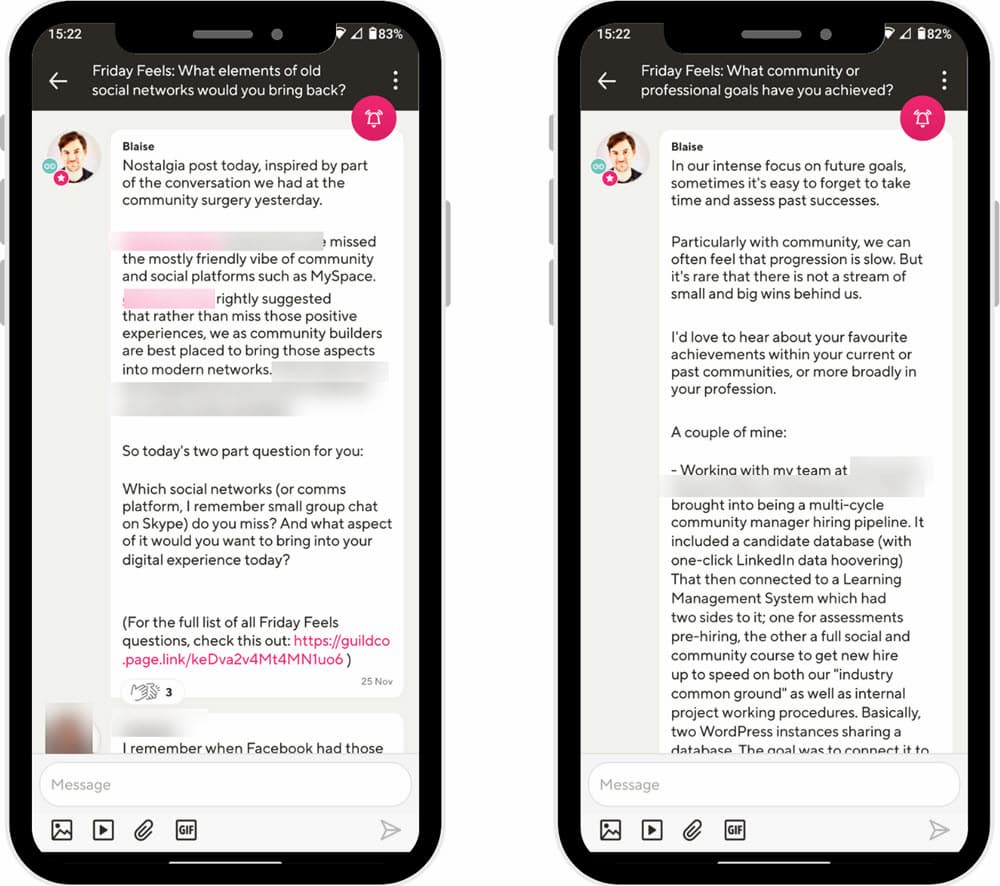
Does a community manager always have to start rituals?
No.
Rituals in a community can be started by community members and they often evolve organically.
But in most communities, rituals are mainly designed or introduced by community managers/hosts and are intentional from the launch of a community.
Sometimes the right type of rituals become obvious as the community becomes more established or mature.
[For more on this read about the online community lifecycle]
Why do rituals help online communities to engage and grow?
Rituals help create a sense of togetherness because they are a group activity. They encourage tight bonds within communities.
They also frequently flag the steps in a common community journey or community lifecycle, marking accomplishments or challenges.
Rituals encourage us to build and share our stories. They help us track our progress in taking collaborative action.
If there is a strong purpose to your community or organisation, they can be decisive in helping members to take the actions they need related to that purpose.
The value of rituals lies in the fact that members often wait for others to post. Rituals show members that they have something in common with others in the community and offer a clearly signposted way to take that first step or to contribute to the community when time is short.
How frequently do community rituals have to happen?
Rituals don't have to have a set cadence, but it helps both you and your members if some do.
Some rituals happen weekly, others monthly, quarterly or annually. In a busy community, you might even have a daily ritual. Some will simply be frequent enough for it to become familiar among your members.
When creating rituals for your community, it’s important to keep in mind that they should be fun and engaging, while still reinforcing the values and goals of the community.
It’s also important to be open to feedback and suggestions from members, as this can help you create rituals that are tailored to the needs and interests of your community.
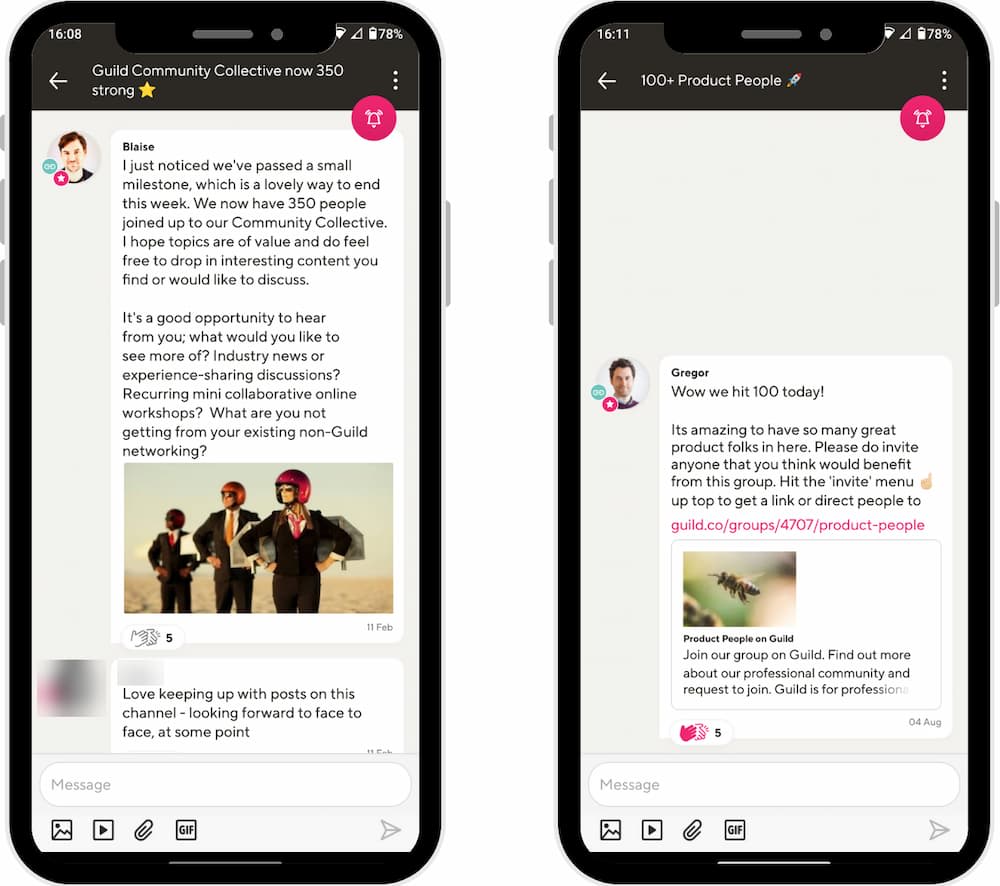
Examples of community rituals
There are some regular initiatives you can put in place for community members to take part in. These will act as rituals for members and over time you'll adapt them to your community's unique culture.
The best community rituals are easy to run, repeatable and rewarding for participants.
Community rituals can take many forms, from simple activities like virtual happy hours, where members can meet online and enjoy conversation and a coffee break, to more involved and focused collaborative, collective activities or challenges.
In a series of discussions facilitated by community host Blaise Grimes-Viort in the Guild Community Collective, the community of community managers, over 800 community managers defined rituals as:
- a discussion post or question on a specific day or time, on a set topic
- something expected with a regular timing
- aiming to create community safety, reliability and stability
In the context of an online community, rituals are prompts or activities that take place regularly enough for your community members to anticipate them and build on them.
A community ritual might be:
- a daily or weekly welcome to new members
- a monthly member spotlight
- a fortnightly poll based on a current, newsworthy topic
- a space to flag community milestones (e.g. 100, 500, 10,000 members) or anniversaries
- a regular round-up of community achievements (e.g. "Weekly Wins")
- an open opportunity for community members to share work or projects they're proud of (e.g. "Made by Me")
- a "what are you working on" question to share current projects/focus
- "Ask Me Anything" (AMA) sessions
- social gatherings, in-person or virtual
- deeper discussions and topic-focused questions
- a member challenge
- light-hearted photo sharing (pets and desk/window views are always popular)
- accountability check-ins
- sharing weekly round-ups or plans
Branding your community ritual?
Sometimes a community activity or prompt will naturally develop into a ritual.
Many community managers create light branding around established community rituals to increase their visibility and importance for your members.
For example, simply giving a regular community meet-up event a catchy name like First Fridays, Third Thursdays, Tool Tip Tuesday, or Community Coffee, or using a consistent emoji/image for a topic can provide structure and help turn a habit into a ritual.
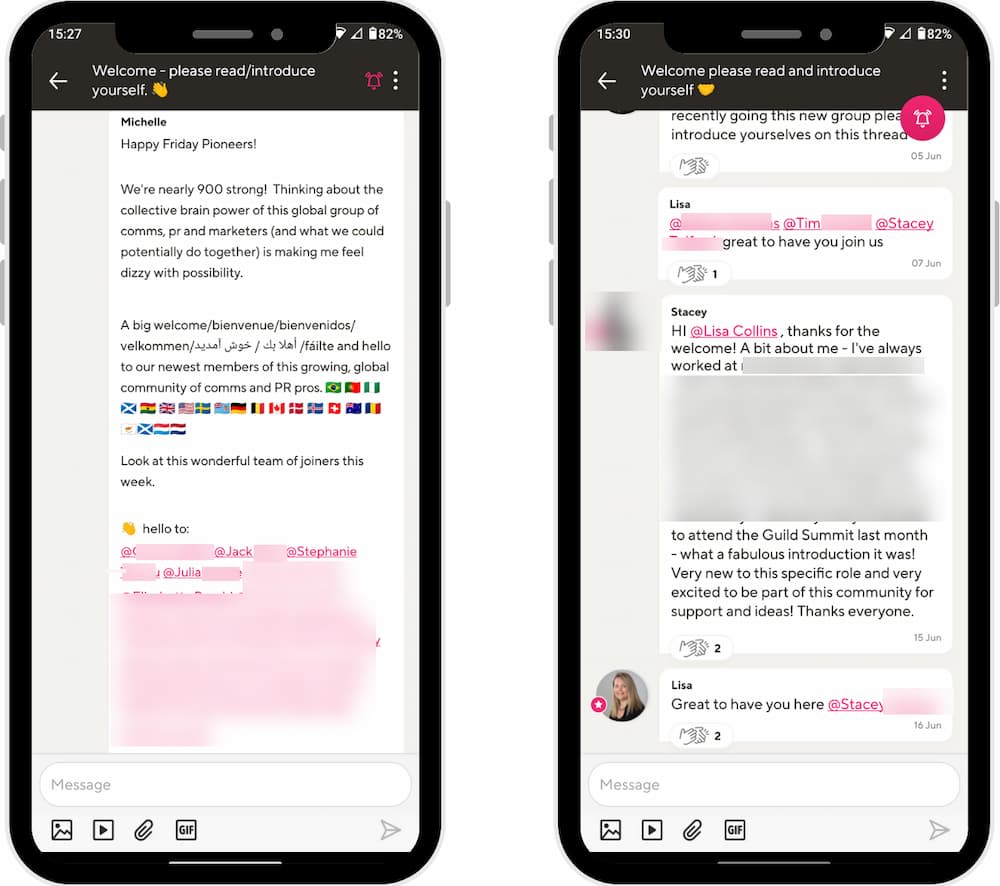
Example community rituals from Guild community managers
Here are some examples of community rituals that community managers and hosts have found work well on the Guild platform.
Question of the week
This is a classic and you'll see variations on this in most communities. Choose a pertinent question tied to the topic or the community. It might be around the challenges your members face. It can fire up honest conversations and reduces the pressure on others to think of community conversation starters.
When planning your community-building posts, identify a small number of thematic pillars to focus on.
For example, in the Guild Community Collective we have a regular 'Friday Feels' question which asks deeper questions about challenges and opinions among community managers.
Set questions to specific days of the week to encourage anticipation among interested members. They will remember to log in to take part in discussions about areas of focus they are most interested in.
Question of the Week can be flipped to Tip of the Week. Instead of a question you could offer a tip on something important to your community and invite members to add their experiences and builds.
AMAs
Ask Me Anything (AMA) sessions are a great way to bring external experience into your community - more details in our How to run an Ask Me Anything guide.
They can also help reach new people through the guest’s own network. Knowing who your members respect will help you to choose appropriate guests.
Anyone with relevant advice and stories to share will be a good bet, and putting them up for a group interview is a quick way to raise engagement in your community.
Community Managers on Guild on paid plans are also taking advantage of the Video Rooms feature to live video stream AMAs and events where community members can ask questions of experts featured in regular events.
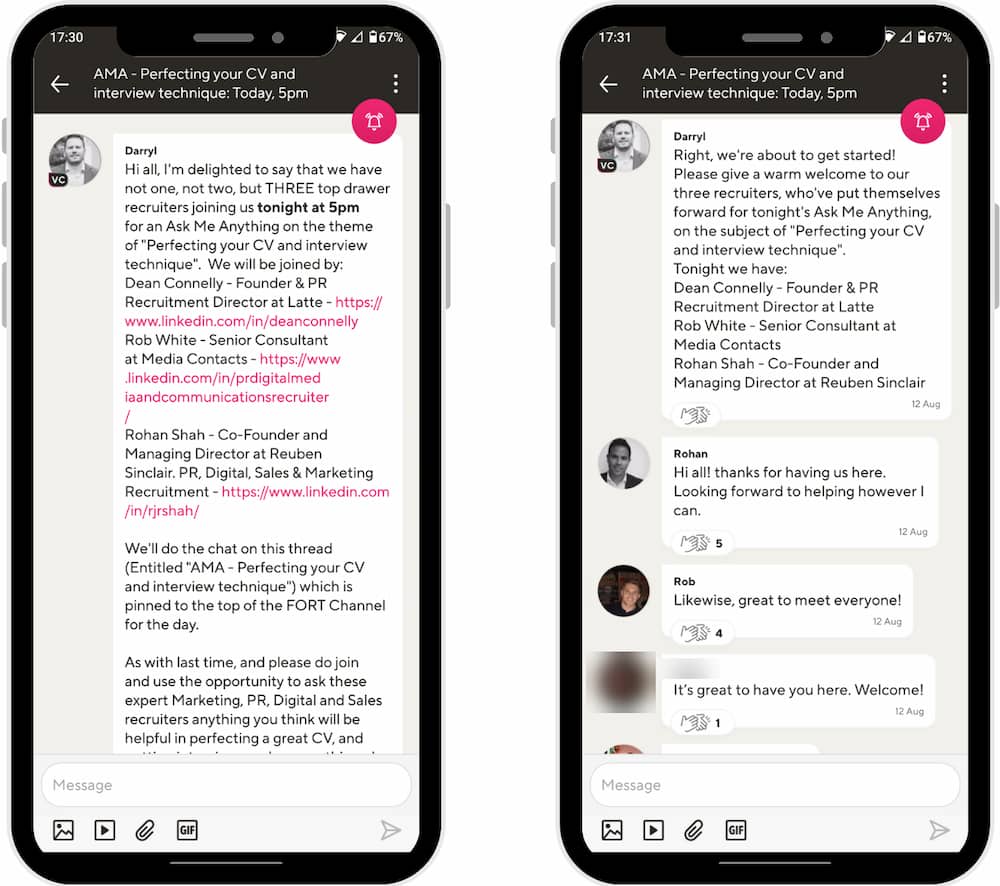
Welcoming new joiners
This is a crucial ritual and core part of community member onboarding that should be put in place. There are a few ways to do it.
Doing it publicly allows other members to join in and make the newcomer feel welcomed and integrated faster.
Frequency depends on the size of your community and the number of new people that have joined, but most Guild community managers will publicly welcome new joiners weekly or fortnightly.
Adding a simple question or a link to a recent discussion thread in the 'Welcomes' will prompt new members to post straight away.
Another option is to send a welcome email or private message to new joiners. This allows for a personable and individual connection. It also guides new members to actions you want them to take like familiarising themselves with the community rules or personalising their Guild profile with a photo or bio.
Asking them for their motivation for joining can help you signpost relevant content in your reply.
Either way, it’s a great way to set a friendly and inclusive tone and encourage follow-on behaviours to drive activity. You can do both personal and public welcomes - in fact, they work well together as you can point your new members to the welcome post when you send them a personal message or email.
Shyness is often a factor that stops new members from becoming active community contributors. By giving them permission and even asking for their help, you're doing your job of being a welcoming host.
Spotlighting community members
Even in the early stages of community growth, you can platform members, their backgrounds and achievements.
This includes aspects of their experiences that are relevant to your community's purpose. You could add personal information that will help other members of the community get to know them better.
This plays into two key psychological aspects. Highlighting people in this way makes them feel they are appreciated and valued. It tells them they can be inspirational to others, along with increasing their own reputation. The benefit is that they don’t have to feel shy or think it inappropriate to promote themselves in such a way. It also encourages other people to share their own successes and seek feedback from fellow community members on overcoming their challenges.
You could combine spotlighting members with an AMA (see above) or your regular welcome thread.
Spotlighting member achievements
A variation on this is a day, hour or conversation thread set aside for members to promote their work or successes.
Most communities have rules against self-promotion or blatant selling, and yet sometimes there are legitimate reasons for members to share something about their work or business.
A specific time or place makes this manageable. For example, some communities run a "Pitching Hour" once a week or have a "Made by Members" thread both to encourage people to share their work and also to keep the rest of the community free of promotion. You can do similar things for job offers and events if these are appropriate for your community.
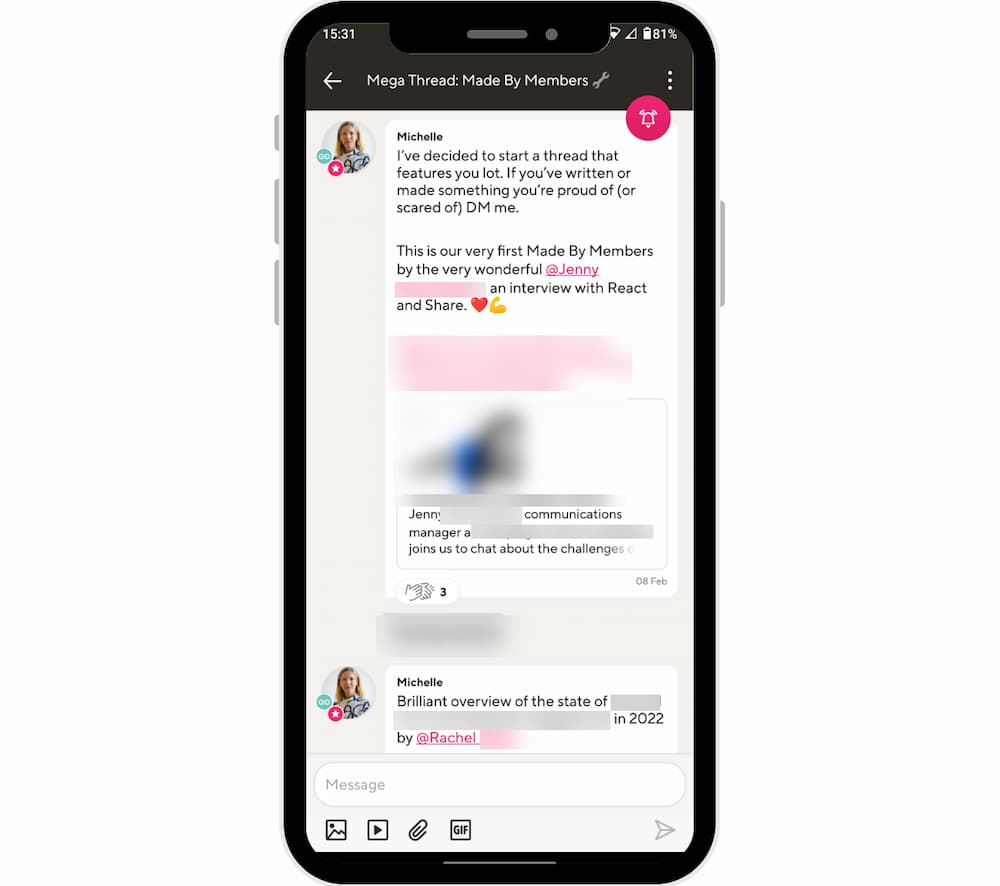
Community Challenges/Community Co-creation and collaboration
At the start of a community, especially a community of purpose or practice, you can ask members to help co-create a useful resource, such as a reference guide or a list of preferred and recommended tools.
When the CREO community for events professionals was launched as the pandemic hit in 2019, the community co-created an emergency event organiser manual to help each other with event insurance questions, health precaution advice and virtual event technology recommendations.
Once your community is established and people know each other a bit better, you can get playful. You can do this by setting challenges for them to pursue and achieve.
Members could help each other towards a community goal. Working towards a personal target in the spirit of competitiveness is also effective.
You can choose to provide rewards or public kudos if they win and allocating a time limit will help keep people focussed.
You could ask people to create a definition or contribute to a co-created project. It could be something simple like asking people to share relevant or fun images or finds.
Regular prompts and updates on how things are progressing will all keep these challenges front of mind. Don’t forget to celebrate with a custom (online) event.
[Further reading: More on community types read: What are the different types of online community?]
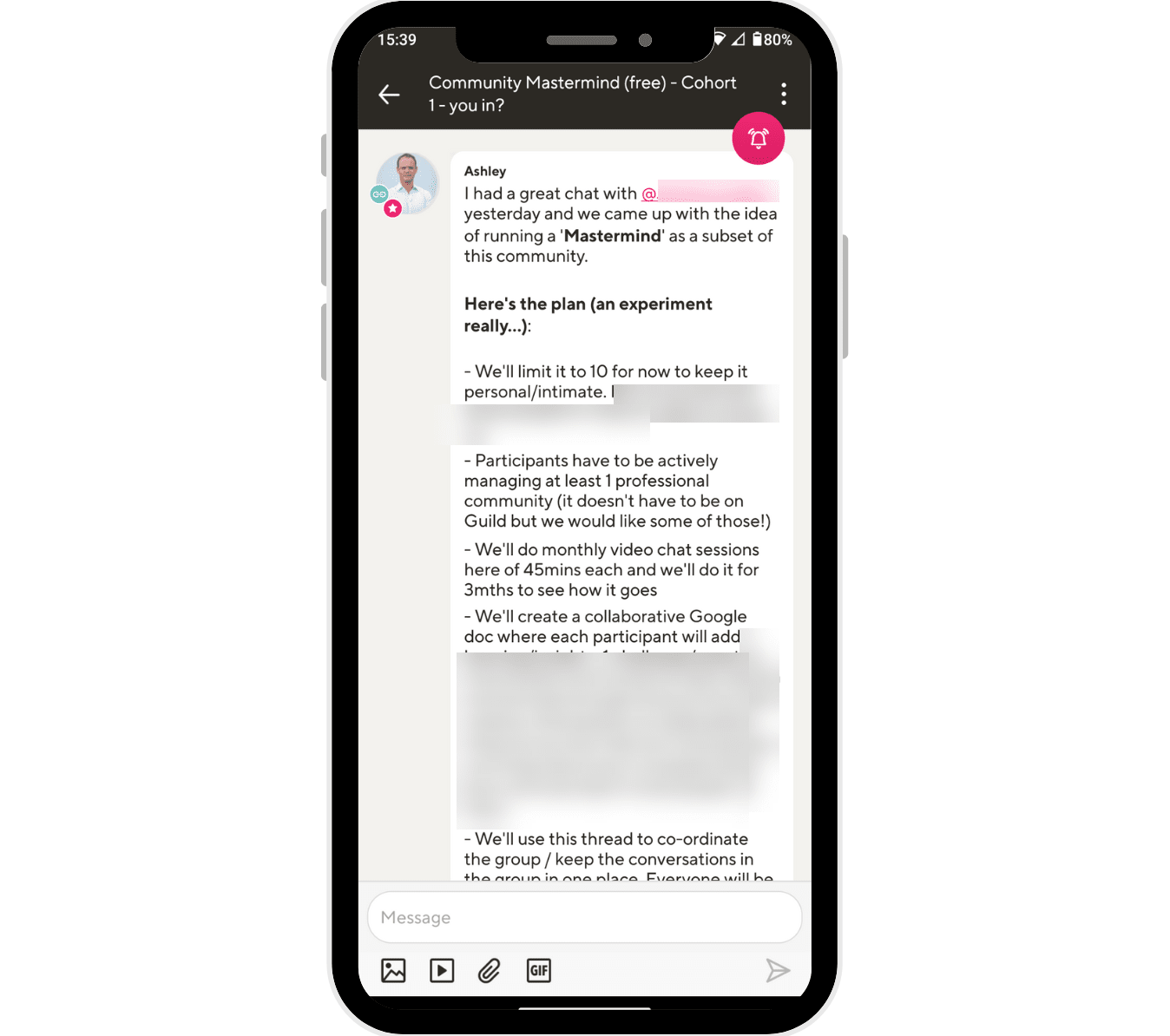
Celebrating community milestones
People will feel positive about their participation if they realise how successful the community is. Highlighting shared community achievements regularly is one way to ensure that’s the case.
Changes in the community size or evolutions in the overall purpose are good opportunities to create a ritual - especially if they are due to the community’s own contributions. Your milestones will depend on your community - you might mark 100 or 1000 members, the 500th conversation, or 5000 posts.
You could also log the number of times a community member has helped another and celebrate 100 or 1000 'supports'.
Discuss each other’s hopes and celebrate growth. Be conscious that the start and end of a year or a quarter year are great times to announce things to your community like this. Constructive closure to the year moves people towards the next stage of their relationships together and can help you set community objectives and milestones for the next year.
Some communities like to share a transparent monthly report as a ritual, for example, how many members were active, how many posts were made or conversations started, and conversation highlights.
It can also be useful to do this outside of your community, as a visibility-boosted post on Guild, or as an email. Do include community highlights in your newsletters or social media to encourage member recruitment as well as to thank and recognise your existing members.
[Further reading: 33 ways to create engagement in your online community]
Community Events
Events - virtual or real-life - can also be rituals.
People know when to expect them, you establish a format and time, and they allow people to see each other as humans. We've all experienced that moment where someone feels, looks or sounds very different in person than they do online!
Examples we've seen in Guild communities include "fireside" chats with experts or professional "surgeries" in the Video Room, book clubs, and real-life drinks or meet-ups at conferences and other organised events.
More than one community has used a "Mastermind" format, combining themed events, co-creation and a dedicated thread to bring people together around the professional challenges they have in common.
If your community members regularly attend outside events, add them to your events or content calendar and see if you can get together a small group from the community at each event.
It helps to cement relations between those who can attend, and they can share back photos or reports to the community for those who can't. Virtual meetings back in the community after real-life events can be similarly valuable.
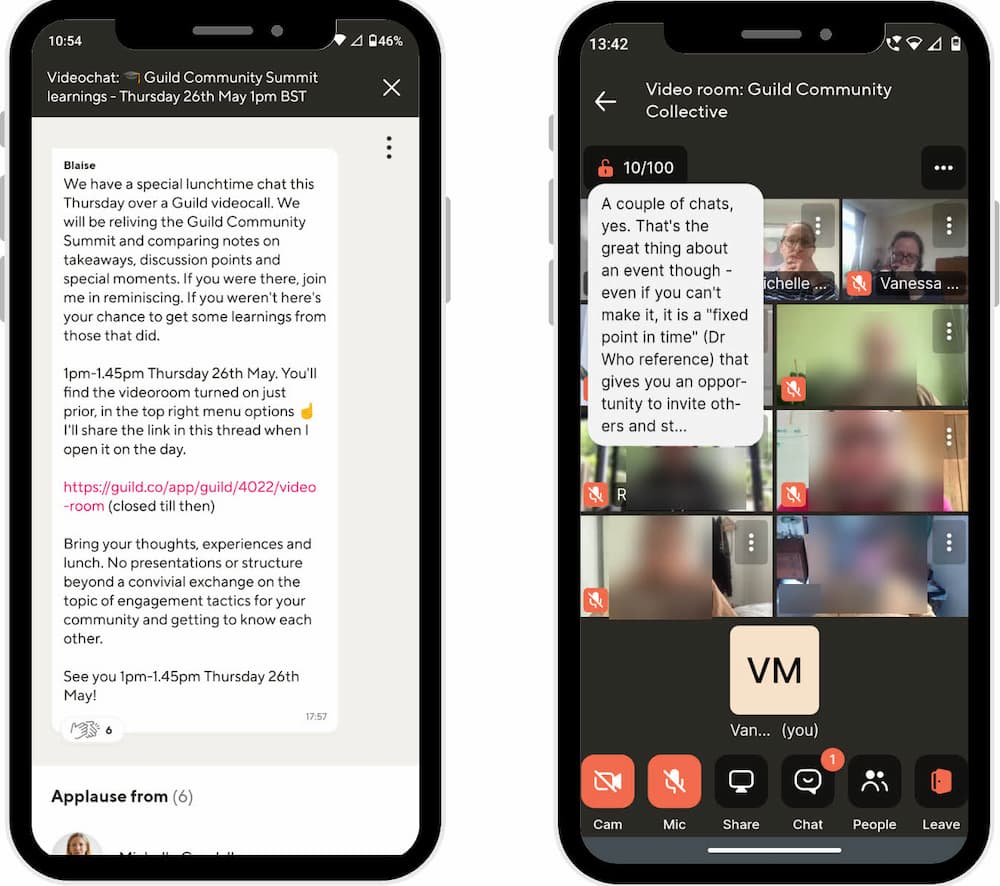
Polls
Polls don't have to be rituals, but they can become one.
You could have a weekly or monthly poll with the same benchmarked questions, e.g. "How optimistic are you about this industry?".
Or you could change the question each week or month.
Polls are a low-stakes way for people to start contributing to a community. They're often anonymous - and sharing the results makes for useful content both inside and outside your community.
See our separate guide on running polls on your Guild community.
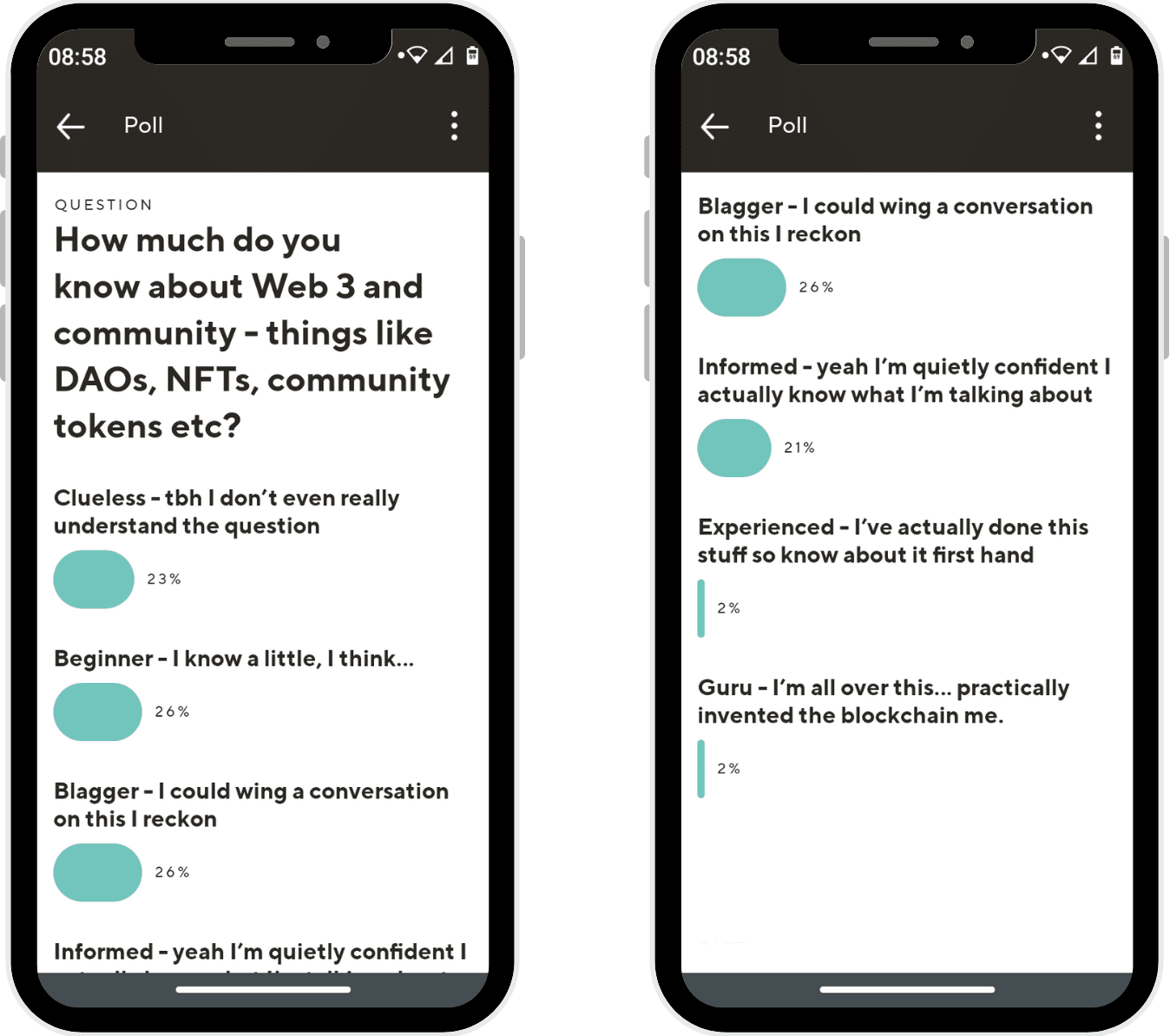
Why should you create community rituals?
Rituals can offer enormous value to your community but they're flexible, too. They'll ebb and flow with your community's needs.
Some might work straight away, and others won't. Don't assume a ritual is a failure - it might just be bad timing for the current state of the community. Try again later.
You can, and should, experiment and co-create with your community members. Ask them what they need and invite them to help you build new rituals to enhance their feeling of belonging.
Rituals can be both a chance to have a little fun and for your members to show their human side, but they can also be safe ways for people to build deeper connections within a community.
When you start to create a new ritual, you can bring people in and make them feel noticed by tagging them or inviting them personally to take part.
Sending out notifications or newsletters can spark curiosity - whether your community is new or an established one that you're trying to revitalise. And sharing outcomes on social media networks helps prospective members to find out what they're missing which can help you grow your membership.
By putting in place rituals like those described here, we can help our members make space in their lives to fully take part.
It sets a tempo that includes the community and helps them make sense of how it fits within their personal goals.
Rituals within your online community will highlight the value it brings them and make it easier for people to contribute even when they're busy elsewhere.
With thanks to Blaise Grimes-Viort, Vanessa McGreevy and Michelle Goodall who contributed to this article.
Photo by Nathan Dumlao on Unsplash
Share ideas and ask for feedback on rituals from fellow Community Managers
Come and join this free online community for community and social media professionals, however experienced you are.
If you’re a community strategist, community builder, community manager or social media professional, join Guild Community Collective.
Share best practices, ideas, inspiration, interesting content and resources. Get feedback from the group on ideas and initiatives, develop partnerships and make useful industry contacts and connections.
We will be running virtual, in-person and hybrid events where we hope many of you will be able to meet.
Join Guild 🤝
See for yourself how the Guild experience is different to WhatsApp, Slack, LinkedIn or Facebook Groups.
Guild is a safe space to connect, communicate and collaborate with others.
Join us on a platform that is purpose-built for creating groups, communities and networks on mobile.
- Just want to join some groups? Simply join Guild and then look through the discoverable groups and communities to find relevant ones to join
- Thinking of running your own community? With an elegant and simple to use, mobile-first UX you’ve got everything you need to start a community - custom branding, analytics, group and user management and support. Get started with your own community here with our free and paid options
Contact us if you want to know more or have any questions